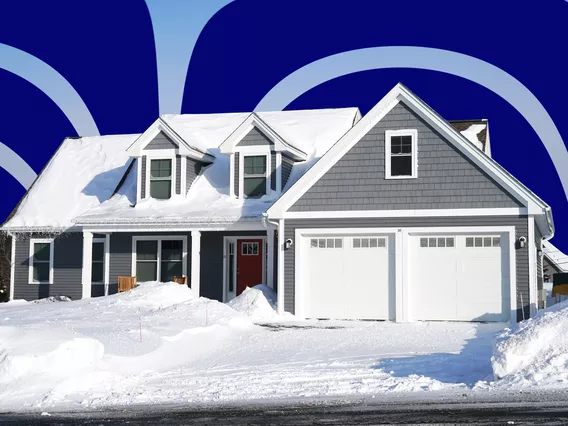Winter storms can be daunting if you’re not prepared for them. But with the right preparation and knowledge, you can make sure your family and home are safe when a storm hits. From stocking up on supplies to weatherproofing your home, here’s what you need to know so that you can be ready for whatever winter throws your way.
How to prepare your house for a winter storm
Winter storms can be very destructive to homes, their infrastructure, and the surrounding area. Power outages and structural damage can even put your life at risk. It’s important to take the necessary steps to ensure you and your home are prepared for winter storms. Here are a few steps you can take to ready yourself:
Stock your food pantry
It’s important to stock up on food before a winter storm hits. Make sure you have plenty of nonperishable items, like canned goods, dry pasta, rice, and other food that doesn’t require refrigeration. You should also have plenty of snacks on hand, like nuts, dried fruit, and granola bars.[1]
Buy bottled water
Having access to clean drinking water is critical during a winter storm. Make sure you have enough bottled water stored away so that you won’t run out if the power goes out or your pipes freeze. It’s also a good idea to invest in a water filter system to purify water from outside sources if you live in an area prone to extreme weather conditions.
Weatherproof your home
Weatherproofing your home is a crucial step to take to protect it from the elements during a winter storm. This includes sealing windows and doors with caulk or weather stripping, insulating walls and attics, and checking for any gaps around pipes or wires where cold air could enter your home.[2]
Weatherproofing will help keep your home warm and reduce energy costs during colder months.
Read More: How to Winterize a House
Invest in a generator or other backup power source
A generator or other backup power source can help keep your home running during a power outage and ensure that you have access to electricity when you need it most. Make sure to check with your local utility company to find out what kind of backup power sources are available in your area.
Install storm shutters over windows and doors
Consider adding storm shutters to protect against wind and flying debris during a storm. Investing in sturdy shutters for your windows and doors is a relatively inexpensive way to help keep your home safe and secure during the winter.
Learn More: Windstorm Insurance: How It Works and What It Covers
Check the batteries in smoke detectors and carbon monoxide detectors
It’s important to make sure your smoke detectors and carbon monoxide detectors are in working order before a storm hits. Check the batteries in all your detectors, replace any that are expired, and test them regularly to make sure they can alert you to a problem.
Make emergency kits for each member of your family
A first aid kit is essential for any household, especially during bad weather or natural disasters. Prepare kits for each person in your house with items such as flashlights, first aid supplies, a cell phone, extra batteries, kerosene heaters, blankets, and other essentials.
Add a change of clothes, nonperishable food that’s easy to open, and anything that can provide warmth and comfort if you have to go without electricity for an extended period of time. Make sure to include any specific medical supplies that your family may need, such as inhalers and EpiPens.[3]
Make a plan for your pets
Make a plan for how you’ll care for your pets in the event of an emergency. Make sure you have extra food and water for them, as well as a plan if you have to bring them with you in your vehicle.
Learn More: Types of Homeowners Insurance: Which One Do You Need?
How to stay safe during a winter storm
Storms can cause power outages, frozen pipes, and damage to your home. Follow the steps below to stay safe during severe weather:
Be aware of the risk of carbon monoxide poisoning
Never use generators, grills, or other gas-powered devices inside your home or garage. Doing so can cause carbon monoxide poisoning, which is fatal. Additionally, clear any snow and ice from vents and exhaust pipes to your home, as blockages can also cause carbon monoxide poisoning.
Stay warm
Dress in layers, drink warm fluids, and stay indoors as much as possible. Winter weather conditions are unpredictable, and it can be challenging to keep your home warm, even with heat sources. Include extra clothing and blankets when creating your winter storm preparedness checklist. Never heat your home with your oven, as it can release carbon monoxide.
Watch for signs of frostbite and hypothermia. Signs of frostbite include numbness, white or grayish-yellow skin, and firm or waxy skin. Signs of hypothermia include shivering, confusion, exhaustion, drowsiness, slurred speech, memory loss, and fumbling hands.[3]
Have a backup plan
Have a plan in place for what to do if there’s a power outage. Staying warm with electricity is much easier than without it. Be prepared to stay warm with blankets and other heat sources. Know places in your community that have power and that you can go to if the cold gets too extreme.
Compare Home Insurance Quotes Instantly
Enter your ZIP codeGet my quotesWhat to do during a power outage
It’s important to be prepared for a power outage as a homeowner or renter. Taking the necessary steps to prepare can help you stay safe and minimize damage to your home. Here are some steps for staying safe during a power outage:
Disconnect appliances and other electronics
Unplug appliances and other electronics. They can be damaged if still plugged in when the power comes back on, as there’s often a power surge when it does.[4]
Make sure you have enough water and food
Buy enough water and food to last several days for your family and pets. Nonperishable food is preferable, as it lasts much longer. Keep your freezer and refrigerator closed to preserve the food inside for as long as possible.
Have a backup generator ready
If you have a generator, make sure it’s properly maintained and stored in a dry area away from your home. It should always be used outdoors and no closer than 20 feet from your windows.[4]
Stay away from fallen power lines
Call 911 immediately if you see any downed lines near your home or property. You can also sign up for outage alerts from your local electricity provider to get updates on when power might be restored.[5]
Know where the nearest community center is
Be prepared to go to the nearest community center with power if the cold gets too extreme. Call your local officials to learn what locations will be used as community centers in the event of a severe storm or power outage. Make sure to pack supplies in your car before driving anywhere, such as food and blankets.
Read Also: Home Insurance Quote Comparison
Winter storm preparation FAQs
Here are answers to some of the most frequently asked questions about winter storm preparation.
-
What should you do during a winter storm?
Winter storms can be dangerous, so it’s important to take the necessary precautions. You should stay indoors and avoid traveling if possible. If you must travel, make sure your vehicle is prepared for the weather, and bring an emergency kit with supplies such as blankets, food, and water.[6]
-
How long does food last in a power outage?
Food can last for several hours in a power outage, depending on how cold it is outside. Keep your refrigerator and freezer doors closed to keep your food fresh. You can also keep cold food in coolers on ice if you have it. After a few hours, though, your food may not be safe to eat anymore.[6]
-
How do you keep your car safe during a winter storm?
Make sure your car is properly maintained and equipped with tires suitable for snow and ice conditions. Check that your windshield wipers are working properly and that you have plenty of windshield wiper fluid to clear away snow and ice. Also, keep an emergency kit with supplies such as blankets, food, and water in case you get stuck somewhere.[7]
-
What is catastrophe insurance?
Catastrophe insurance is a type of insurance policy that covers losses from events like hurricanes, floods, earthquakes, and other natural disasters. It helps protect property owners from financial losses due to damages caused by these severe weather events.
Compare Home Insurance Quotes Instantly
Enter your ZIP codeGet my quotesSources
- U.S. Department of Homeland Security - FEMA. "Prepare Yourself for a Power Outage." Accessed February 14, 2023
- Centers for Disease Control and Prevention. "Preparing for a Winter Storm." Accessed February 14, 2023
- U.S. Department of Homeland Security - Ready. "Winter Weather." Accessed February 14, 2023
- U.S. Department of Homeland Security - Ready. "Power Outages." Accessed February 14, 2023
- American Red Cross. "Power Outage Safety." Accessed February 14, 2023
- Centers for Disease Control and Prevention. "Food Safety for Power Outages." Accessed February 14, 2023
- The National Safety Council. "Be Prepared for Winter Driving." Accessed February 14, 2023





